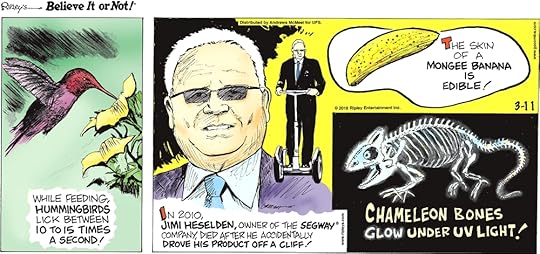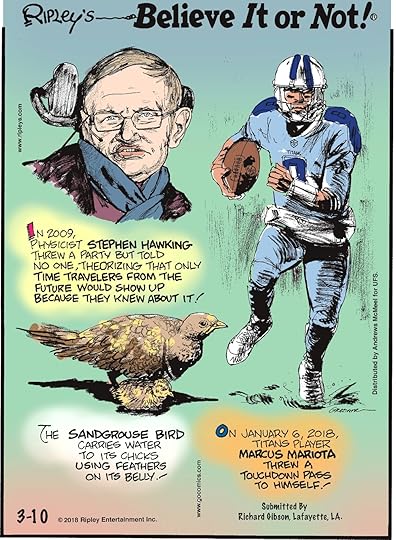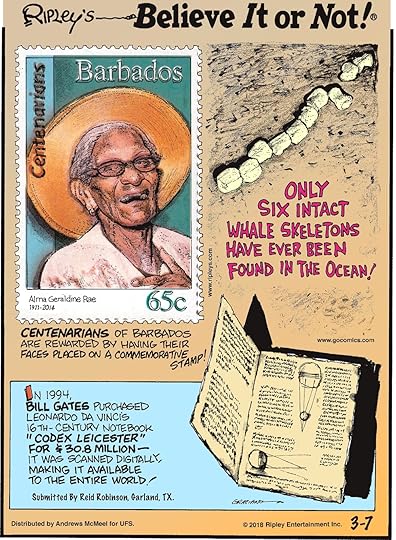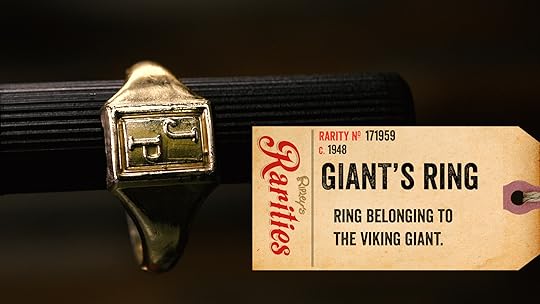Ripley Entertainment Inc.'s Blog, page 357
March 11, 2018
CARTOON 03-11-2018
March 10, 2018
CARTOON 03-10-2018
March 9, 2018
Voodoo Dolls of Your Boss Could Improve Productivity
Featured in Ripley's Believe It or Not!
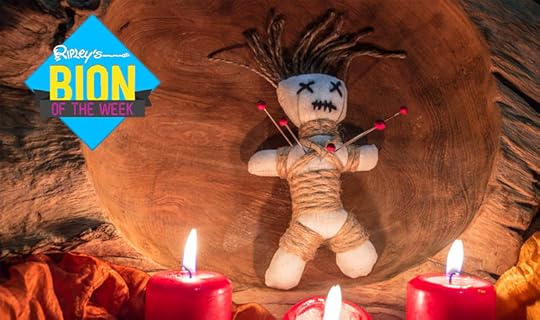
[March 4th-10th, 2018] This week a woman finds a 131-year-old message in a bottle, a four-eared kitten finds a home, and voodoo dolls emerge as a workplace solution to stress relief.
Four-Eared Kitten
A kitten with an unusual four ears has found its forever home in Australia. A cat fosterer and employee at the Feeling Animal Welfare Society decided to take Frankie—short for Frankenstein—home permanently. The poor kitty was found with a severe eye infection but is now receiving proper care.
A post shared by frank_n_kitten (@frank_n_kitten) on Mar 4, 2018 at 10:06pm PST
Cheesed Off
England, well known for its love of cheese, held the Big Cheese Festival this past weekend. The festival featured local bands and “cheesy DJs,” but committed a grievous sin. They ran out of cheese. Especially upsetting after we cleared cheese from causing nightmares just days before.
For sale, one wristband, hardly used #BigCheeseFestival #TBCF #BigMudFestival pic.twitter.com/LGwDaxJBWL
— Julie Ferret (@julie_ferret) March 3, 2018
Alexa’s Creepy Laugh
While Amazon Alexa users like to start their morning with a flash briefing, like Ripley’s Weird Minute, they apparently don’t like when the chatbot decides to laugh at them with a creepy unprovoked giggle. Some users didn’t realize the ominous laughter was coming from the smart speaker, fearing home invasion or haunting. Amazon claims it’s a bug and is working to de-chuckle Alexa.

Oldest Message In a Bottle Found
On June 12, 1886, a German ship cut through the waves of the Indian Ocean. The captain of the ship decided to chuck a gin bottle into the sea, with a note containing the date and ship’s coordinates. An Australian woman walking on the beach 131 years later found the note and bottle. Believe it or not, the bottle wasn’t just a flight of fancy but was part of a German study of ocean currents.
Voodoo Dolls Improve Productivity
According to a study conducted by Wilfrid Laurier University, workers punishing voodoo dolls of their bosses can help relieve stress and improve the quality of their work. A group of 229 workers were encouraged to create effigies of their bosses and stick the dolls with pins, burn them with candles, and pinch them with pliers. Participants reported an increase in their sense of justice in the workplace after engaging in “symbolic retaliation.”
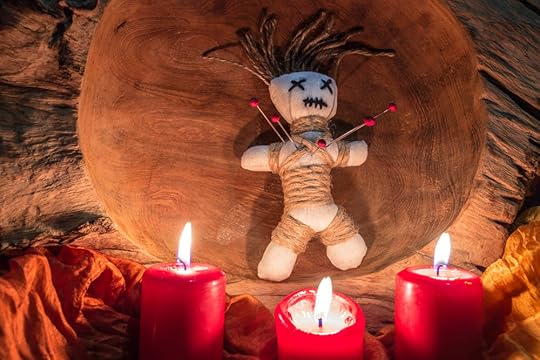
Source: Voodoo Dolls of Your Boss Could Improve Productivity
Mermaid Sightings Throughout History Leave Us Wondering If We Believe It or Not!
Featured in Ripley's Believe It or Not!
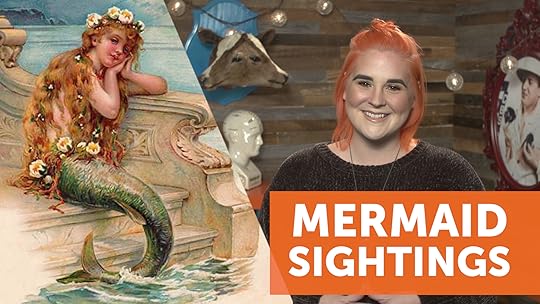
We recently examined the evidence of unicorns possibly being real at one point in history, but could the same be said for another glittery myth—mermaids?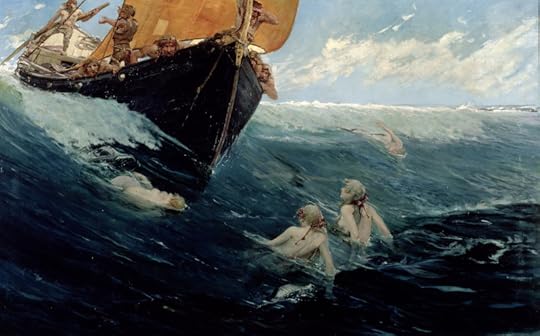
Mythology

Greek mythology regales stories of the merman god Triton and some modern religions, like Hinduism, worship mermaid-like deities to this day.
Half beauty. Half fish. Don’t let Ariel dupe you. Even Hans Christian Andersen’s The Little Mermaid is more twisted than you think. Our protagonist mermaid has her tongue cut out, gets turned down by the prince, and bubbles away into sea foam because she doesn’t have the guts to literally stab his heart and bathe in his blood—a far cry from a dancing crab!
For centuries, stories of mermaids have taken a much darker turn than a short bout of chronic laryngitis. Russia tells the tale of rusalki, the vengeful souls of women that live on as mermaids to punish men and children by drowning, and Scottish folklore fears the Blue Men of Minch, who lure sailors to their death, dragging them into the water to feast on their flesh.
Dear Diary
Aside from fearful folklore, eyewitnesses have claimed to see mermaids with their own two eyes. Famous for settling Jamestown, John Smith recorded a mermaid sighting in 1614, off the coast of Newfoundland.
“Her long green hair imparted to her an original character that was by no means unattractive,” mused Smith.
Christopher Columbus was a little more picky. Arguing that he saw three mermaids off the coast of Haiti on his first voyage to the Americas, in 1493, Columbus wrote, they “rose well out of the sea; but they are not so beautiful as they are said to be, for their faces had some masculine traits.”
Columbus was likely checking out three manatees, making his mermaid logbook entry the first recorded observation of the marine mammal in North America.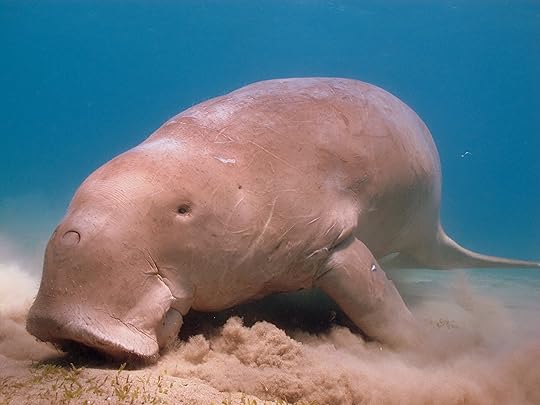
Related to the manatee, the dugong may have also been confused for mermaids. Literally meaning “lady of the sea” in the Malay language, dugongs are very similar appearance. In at least one instance, an alleged mermaid skeleton was proven to be a dugong.
Jenny Hanivers

Long before Barnum showcased his mummified Fiji Mermaid, sailors had already began making mermaids.
Jenny Hanivers were curious souvenirs that began to appear in Antwerp around the mid-16th century. For centuries, Jenny Hanivers were thought to be proof that mermaid-like creatures existed, but that theory was soon debunked. Jenny Hanivers are actually derived from skates and rays.
Sailors dried, carved, and varnished the carcasses of these fish to resemble mermaids. Much like P.T. Barnum’s Fiji Mermaid, Jenny Hanivers were a hoax—nothing more than dead, disfigured rays. Regardless, they remained popular up until the 19th century.
But, Maybe?
With over 95% of our ocean unexplored, could mermaids be lurking in the deep? The National Oceanic and Atmospheric Administration advises that “no evidence of aquatic humanoids has ever been found.” But with numerous accounts of mermaids throughout human history, we’ll let you Believe It or Not!
Source: Mermaid Sightings Throughout History Leave Us Wondering If We Believe It or Not!
CARTOON 03-09-2018
March 8, 2018
The Secret Artist Behind Mickey Mouse: Ub Iwerks
Featured in Ripley's Believe It or Not!

Or Not
In today’s world many misconceptions have been perpetuated—becoming modern day “facts”—when, in reality, myths and hearsay have taken over. Sorry to burst your bubble, but in this weekly column, Ripley’s puts those delusions to the test, turning your world upside down, because you can’t always…Believe It!
Today: The creation of Mickey Mouse.
Ub Iwerks and Mickey Mouse
Mickey Mouse is the mascot of the Walt Disney company’s many shows, movies, theme parks, and toys. Approaching his 90th birthday this year, we decided to look into Mickey’s past, and decide whether the company’s founder, Walt, really deserves credit for creating the iconic cartoon character.
Ub Iwerks is attributed sporadically as a contributing creative force to the creation of Mickey, but the two worked together long before the merry mouse. The two met working in a commercial art studio in 1919. Iwerks was an industrious and innovating animator, outpacing many of his fellow cartoonists and developing a new animation technique that combined live actors with drawn characters.
Oswald the Lucky Rabbit

Disney, fast becoming an adept businessman took Iwerk to Universal studios, pitching the new animations. There, they fell under the influence of Charles Mintz, who would have the pair create an original character—anything but a cat—to sell the studio.
In 1927, the duo returned with Oswald the Lucky Rabbit, a character that predates Mickey, but whose artwork—by Iwerks—would be very similar. The studio liked Oswald, and Disney set up an animation company to produce a series of animated shorts.
After a time, Disney had taken the management reigns of the endeavor and pushed Mintz for a more lucrative salary. Mintz would have none of it. He informed Disney that Universal owned the character and that he could easily hire the Disney animation staff out from under him.
An important learning moment and a dark lesson for Walt, he knew never to let another person own his characters. The only animator to leave Universal with him was his old friend Ub, but the two desperately needed a new character to sell.
Inventing Mickey
Here the stories become much more complicated. While Mickey would eventually emerge as the new studio’s character, the particulars of his conception are muddled at best. While the Walt Disney Company will sometimes credit Walt and Ub for his creation, Walt Disney’s own stories about coming up with the idea for Mickey have varied wildly.
 Family members say he came up with the mouse on his way home from his meeting with Mintz. Walt would tell stories of a trained mouse he had kept while drawing late into the nights at the studio. His home city of Kansas regaled tales of him playing with mice in his family barn. While these stories could be true, we know for a fact that Disney was a clever storyteller and a cunning salesman with a history for changing details about Mickey when the ends suited him.
Family members say he came up with the mouse on his way home from his meeting with Mintz. Walt would tell stories of a trained mouse he had kept while drawing late into the nights at the studio. His home city of Kansas regaled tales of him playing with mice in his family barn. While these stories could be true, we know for a fact that Disney was a clever storyteller and a cunning salesman with a history for changing details about Mickey when the ends suited him.
With the outstanding success of Steamboat Willie, the studio’s success was cemented. Disney whipped his character into a money-making machine, licensing the character for advertisements and cultivating a fan club that would carry him into the creation of the world’s first theme parks. One particular adjustment he constantly made was the date of Mickey’s birthday. While most Disney scholars acknowledge the premiere of Steamboat Willie as Mickey’s birthday, Disney had no problem changing it to line up with whatever promotion paid him best.
Growing Rift
Amidst this avalanche of cash and credit, Ub Iwerks would have a number of falling outs with his long-time friend. According to one report, after hearing Walt regale an audience with how he had invented Mickey, a little girl asked him to draw his famous character, and, without a thought, he passed the job on to Iwerks. Ub Iwerks soon left Disney to start his own animation company, feeling he was underappreciated for his role at Disney’s studio.
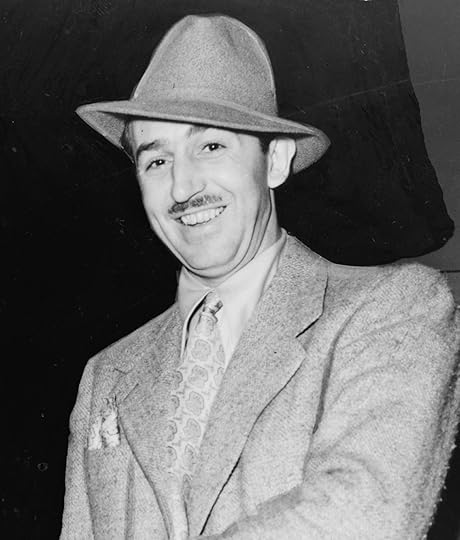
Walt Disney
While it’s fair to question Disney’s role in making the mouse, is it fair to say Iwerks was solely responsible? One thing we’re sure of is that Iwerks was almost completely responsible for the art and design of Mickey in the shorts he animated—and that he had drawn Oswald, the character Mickey is almost a blatant copy of. While Walt Disney may have helped conceptualize the character, or have even suggested a mouse, it is Iwerks who inevitably drew and designed Mickey. Disney, on the other hand, was busy putting into practice what he learned from Mince, making good on his promise to own his characters.
Either way you look at it, Iwerks likely is responsible for the character of Mickey, but Disney was pivotal in making him a household name. Much like the controversy over the creation of many Marvel characters between Stan Lee and Jack Kirby, however, there’s much incentive for the company man to claim ownership of it all, and Disney—which also owns Marvel now—has all the power it needs to keep anyone from proving otherwise.
CARTOON 03-08-2018
March 7, 2018
This Unstoppable Game Boy Survived a Gulf War Bombing
Featured in Ripley's Believe It or Not!

This original Game Boy was hit by a barracks bombing during the first Gulf War, and it still works just fine!
As you’ll often hear people complaining these days, they just don’t make things like they used to. Our cell phones, iPods, Kindles, and tablets aren’t really built to last. Manufacturers just want us to make it to the next upgrade, but things were different back in the day, though.
The Game Boy: Unstoppable. Unbombable
Gamers like to joke that Nintendo 64 cartridges could shrug off a hit from a ballistic missile, but the Game Boy? That was a real powerhouse portable. Not in terms of tech specs, but you could probably bring down an elk if you threw it right. Believe it or not, there is one Game Boy that emerged from a Gulf War attack unscathed (well, ‘unscathed’ may be a little generous).

The Gulf War was a conflict that took place between August of 1990 and February 1991, between Iraq and a coalition led by the United States. The US joined forces with the United Kingdom, Bangladesh, Egypt, Saudi Arabi, and Italy in response to Iraq’s invasion of Kuwait. The conflict was controversial, costly and highly televised, but in the midst of it all, a humble little Game Boy failed to make the news.
Still Playing Tetris Like A Champ
Over a decade later, the plucky handheld rose to stardom when it was recovered and its war story revealed. The Nintendo system was damaged during a heavy bombing of the soldiers’ barracks but was found still functioning! Clearly, the poor thing’s seen better days, and could probably do with a month-long vacation and a couple of years’ sleep, but this is incredible!
The remarkably resilient Game Boy now resides at the Nintendo New York store in Manhattan. This Rockefeller Center attraction is world famous for its Nintendo memorabilia. If you visit, you won’t want to miss the impossible ‘Gulf War Game Boy,’ happily running Tetris like nothing ever happened.
By Chris Littlechild, contributor for Ripleys.com.
Source: This Unstoppable Game Boy Survived a Gulf War Bombing
CARTOON 03-07-2018
March 6, 2018
The Viking Giant’s Ring
Ripley Entertainment Inc.'s Blog
- Ripley Entertainment Inc.'s profile
- 52 followers


